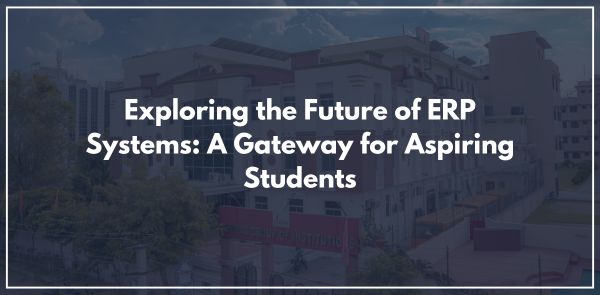
Exploring the Future of ERP Systems: A Gateway for Aspiring Students
Ms.Shubhangini Agarwal
Assistant Professor
Poddar International College, Jaipur
___________________________________________________________________________
Introduction: In the digital age, Enterprise Resource Planning (ERP) systems serve as the backbone of modern businesses, integrating various functions and processes into a unified platform. From finance and human resources to supply chain management and customer relationship management, ERP systems streamline operations and enable data-driven decision-making. This article delves into the realm of ERP systems, highlighting their significance, evolution, and promising future prospects for students aspiring to enter the world of business and technology. Poddar International College is Top Computer Science Colleges in Rajasthan.
Understanding ERP Systems: ERP systems are comprehensive software solutions designed to facilitate the management of core business processes across an organization. These systems typically consist of integrated modules that address specific functions such as accounting, inventory management, procurement, and production planning. By centralizing data and automating workflows, ERP systems enable businesses to improve efficiency, reduce costs, and enhance visibility into their operations.
Evolution and Adaptation: The evolution of ERP systems traces back to the 1960s when businesses began exploring ways to automate manual processes and improve organizational efficiency. Early ERP solutions focused primarily on back-office functions such as accounting and inventory management. However, as technology advanced and business needs evolved, modern ERP systems expanded to encompass a broader range of functionalities, including human capital management, business intelligence, and e-commerce integration.
Future Scope: The future of ERP systems appears promising, driven by the ongoing digital transformation of industries and the growing demand for integrated business solutions. As businesses seek to leverage data analytics, artificial intelligence, and machine learning to gain insights and drive innovation, ERP systems will play a crucial role in enabling these capabilities. Moreover, with the rise of cloud computing and Software-as-a-Service (SaaS) models, ERP solutions are becoming more accessible and scalable for organizations of all sizes.
Importance of Skill Development: To thrive in the field of ERP systems, students must develop a diverse set of skills encompassing business acumen, technical proficiency, and problem-solving abilities. Knowledge of fundamental business processes and operations is essential for understanding the functional requirements of ERP systems and designing effective solutions. Additionally, proficiency in programming languages such as SQL, Java, or Python is valuable for customizing and extending ERP software to meet specific business needs. Moreover, familiarity with data analytics tools and methodologies can enhance one's ability to extract meaningful insights from ERP data.
Educational Pathways: Students interested in pursuing careers in ERP systems have various educational pathways to consider. Business schools and management programs often offer courses and concentrations in operations management, supply chain management, and enterprise systems, providing students with a solid foundation in ERP concepts and principles. Alternatively, technical programs in computer science, information systems, or software engineering can provide students with the technical skills and knowledge needed to develop and implement ERP solutions.
Building Practical Experience: Beyond formal education, students can enhance their skills and credentials by gaining practical experience through internships, co-op programs, or project-based learning opportunities. Participating in ERP implementation projects, conducting case studies, or working with ERP software vendors can provide valuable hands-on experience and insight into real-world ERP challenges and solutions. Additionally, pursuing ERP certifications, such as those offered by SAP, Oracle, or Microsoft, can validate one's expertise and enhance their credibility in the job market.
Conclusion: In conclusion, ERP systems play a pivotal role in enabling organizations to streamline operations, improve efficiency, and drive innovation in today's increasingly complex business environment. As businesses continue to invest in digital transformation initiatives, the demand for skilled professionals proficient in ERP systems is expected to grow. Poddar International college provide ERP system to improve student management. By investing in skill development, pursuing educational opportunities, and gaining practical experience, students can position themselves for rewarding careers in this dynamic and ever-evolving field of business and technology.